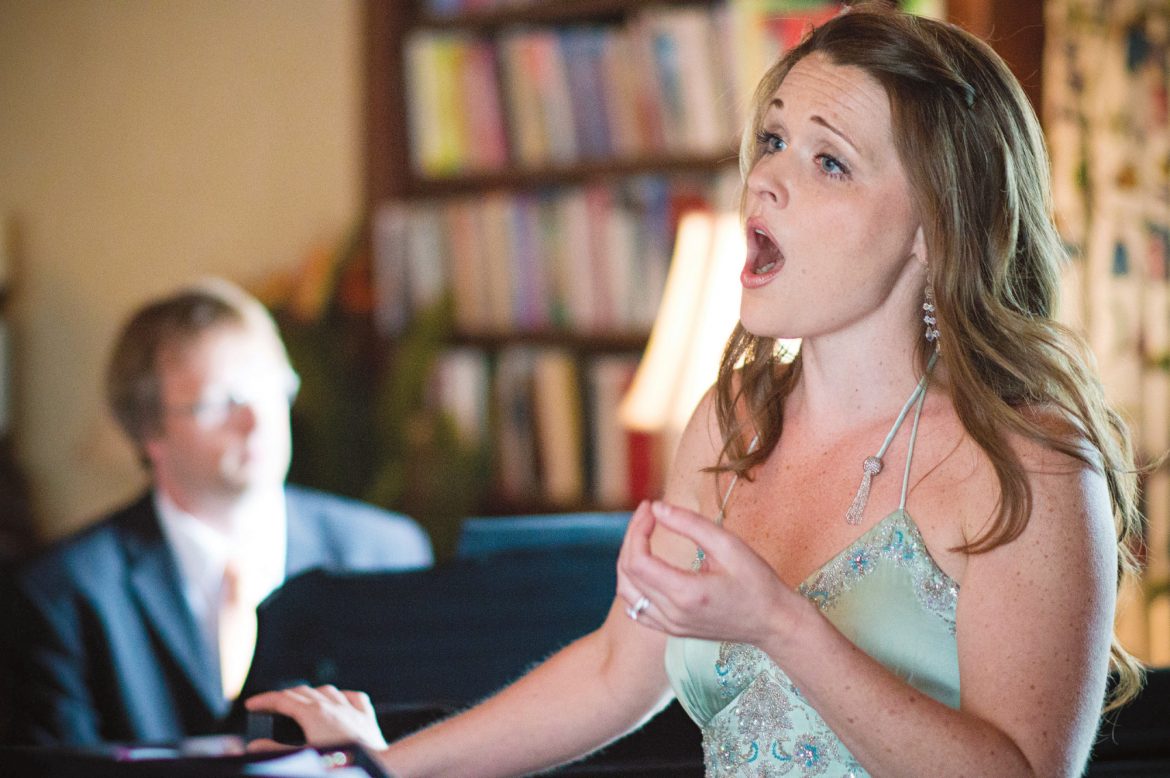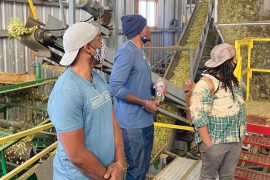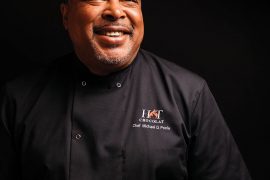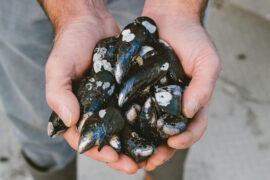Written by Cathy Carroll
Dawn Wolski brings Opera Grams, an Opera Truck and a sustainable model to ‘the most expensive art form’
Dawn Wolski was on the phone with the director of external affairs in Gov. Jay Inslee’s office, four hours before a public announcement about revised guidelines around the pandemic last year. Wolski, general and artistic director of Inland Northwest Opera, listened as the official told her she’d have to scuttle the company’s new Opera Grams—an innovation that let arts-starved Spokane residents order up a baritone, soprano or tenor in formal attire to their doorstep to sing two arias.
Wolski reiterated that it involved a sole vocalist singing to one family from 20 feet away. The official said that didn’t matter. Wolski pursued the logic. “So I can’t sing ‘Happy Birthday’ across the driveway to my neighbor?” she asked. How could the Opera Gram be a danger when restaurants were open at 25 percent capacity? “This is not Footloose,” she told him. “Arts are not the problem, we deserve an equal seat at the table.”
Opera Grams, and Wolski, prevailed. “I like the good fight, but I like to fight for the underdog,” she said. “I love to represent our singers and make sure they’re being treated well. I love to advocate.” That drive has propelled the opera company since 2017, when Wolski was asked to lead the organization in its transition from Opera Coeur d’Alene to its current incarnation, broadening its reach, offering professional opera across Eastern Washington and northern Idaho.
Since then, performances, audiences and revenue have grown exponentially. Following Wolski’s international singing career, she has been recruiting acclaimed talent from major markets for leading roles. The operating budget has nearly tripled with productions such as Tosca, Carmen, Così fan tutte and Madame Butterfly.
She moved to Spokane nearly thirteen years ago from New York City with her husband, Mateusz Wolski, who was recruited to be concertmaster of the Spokane Symphony, having studied under New York Philharmonic concertmaster Glenn Dicterow and toured internationally as a violinist with more of the world’s most distinguished conductors. Dawn, who’d been teaching voice at New York University, began doing the same at Whitworth University in Spokane while traveling, and taking roles in operas.
The couple met at New York City’s Manhattan School of Music. She grew up outside of Washington, D.C., where her father worked for the National Security Agency, and at the music school, she wanted to explore her Polish heritage. Wolski was asking around for help with some Polish songs and stumbled across a student from Warsaw. “He was very tough on me, and I was very tough. I like hard work, I don’t like to quit, and so the energy was really great right off the bat. He was coaching my Polish, and something I thought would take an hour took many sessions, but I think he stretched it out.”
After earning her master’s in music at the conservatory, she was in musicals at the Folger Shakespeare Library theater in Washington, D.C., and heard about an opening at the elite U.S. Army Field Band. She was cast, and toured for the next five years with that band, performing with the London Symphony, the Boston Symphony and National Symphony. She has shared the stage with Julie Andrews, Wynonna Judd, Pam Tillis and Chris Isaak, as well as several U.S. presidents. Not only did the work allow her to pay off her graduate school loans, she toured with her best friend, Sara Jones, a pianist and jazz singer who won the other vocal position.
Wolski has “a gorgeous, clear, almost crystalline tone,” which was envied by other singers in their undergraduate program at St. Mary’s College in Maryland, Jones said. When they visited Vienna one summer, performing with the college chamber singers, they saw The Tales of Hoffman with Natalie Desay. “Afterwards, our 19-year-old heads were blown,” said Jones. “The thing is, I thought Dawn already sounded as great as Natalie Desay.”
Wolski throws herself wholeheartedly into any task, whether it’s challenging herself by cooking diverse cuisines or gardening with her 6-year-old son, Stefan. She approaches life with professionalism and vigor, said Jones, who also teaches voice at Towson University in Maryland. In their Army days, Wolski convinced Jones to audition a solo with her. They sang the “The Flower Duet” from the opera Lakmé, a stretch for Jones, who returned the favor by making her sing a duet of Cole Porter’s “Friendship” from Anything Goes. “She was hilarious, and had no problem being cheesy and funny with me. It was two sides of the same coin, and she did both really well. INO is so lucky to have her as an advocate, because no one knows how to put on a great show like Dawn.”
In Spokane, Wolski led the charge for a new, expanded Inland Northwest opera. It had been operating at a deficit and it needed a more sustainable model. It’s rare for a region of its size to have an opera company of their caliber, considering it’s “the most expensive art form on the planet, just because it incorporates absolutely everything,” Wolski said. “I wanted to make sure that we have full regional support to succeed, so it has been a kind of fun turnaround.”
The company was strong going into lockdown and maintained an equal level of support throughout. It got creative with solutions such as Opera Grams, the first live arts permitted in the state during the pandemic, Wolski said.
The public health crisis underscored the importance of the arts, she said. “The hierarchy of needs, food, water and shelter are absolutely critical, but without human connection it’s not quite right.”
The job of the arts is not passive, Wolski said, especially not live opera. “You don’t sit and watch in the same way as with a two-dimensional screen. There’s the connectivity of hearing the voices from an opera stage, which are unlike any other. They are raw and they travel great distances, unamplified, to kind of make your bones rattle and to reach you in your gut.” That only happens with a trained opera singer who’s well supported in their lower body.
Yet even light entertainment, performed live “connects us with each other outside of demographics, politics—it’s transcendent,” she said. “Our job is to bring people together.”
It also means bringing opera to the people. Think arias on wheels. This summer the INO is debuting its Opera Truck, with a wood stage that unfolds like a flower beneath a bandshell-style awning. Wolski believes it will introduce the art form to a broader audience. “People just need to hear good music, even if they don’t know it,” she said.
For upcoming performances, visit www.inlandnwopera.com.








